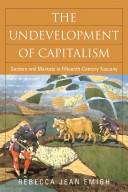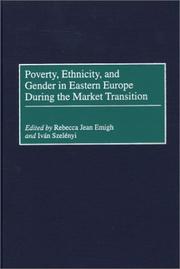| Listing 1 - 10 of 14 | << page >> |
Sort by
|

ISBN: 9781592136186 1592136184 9781592136193 1592136192 Year: 2009 Publisher: Philadelphia, Pa Temple University Press
Abstract | Keywords | Export | Availability | Bookmark
 Loading...
Loading...Choose an application
- Reference Manager
- EndNote
- RefWorks (Direct export to RefWorks)
Capitalism --- History --- Tuscany (Italy) --- Economic conditions. --- History. --- History of Italy --- anno 1400-1499 --- Tuscany
Book
ISBN: 1592136206 1281973181 9786611973186 Year: 2009 Publisher: Philadelphia : Temple University Press,
Abstract | Keywords | Export | Availability | Bookmark
 Loading...
Loading...Choose an application
- Reference Manager
- EndNote
- RefWorks (Direct export to RefWorks)
The results of a decade-long research study by the author, in The Undevelopment of Capitalism Rebecca Jean Emigh argues that the expansion of the Florentine economic market in the fifteenth century helped to undo the development of markets of other economies, especially the rural economy of Tuscany, paradoxically slowing down the economic development of northern Italy overall. This ""undeveloping"" process, as Emigh calls it, produced an advanced economy at the time of the late Middle Ages and early Renaissance, but created the conditions whereby much of this area of Europe delaye
Capitalism --- History --- Tuscany (Italy) --- Economic conditions. --- History.
Article
Abstract | Keywords | Export | Availability | Bookmark
 Loading...
Loading...Choose an application
- Reference Manager
- EndNote
- RefWorks (Direct export to RefWorks)
Book
ISBN: 1137485027 134955359X 1137485035 Year: 2016 Publisher: New York : Palgrave Macmillan US : Imprint: Palgrave Macmillan,
Abstract | Keywords | Export | Availability | Bookmark
 Loading...
Loading...Choose an application
- Reference Manager
- EndNote
- RefWorks (Direct export to RefWorks)
Antecedents of Censuses From Medieval to Nation States, the first of two volumes, examines the influence of social formations on censuses from the medieval period through current times. The authors argue that relative influence of states and societies is probably not linear, but depends on the actual historical configuration of the states and societies, as well as the type of population information being collected. They show how information gathering is an outcome of the interaction between states and social forces, and how social resistance to censuses has frequently circumvented their planning, prevented their implementation, and influenced their accuracy.
Census --- Demography --- Statistics - General --- Social Sciences --- Anthropogeography & Human Ecology --- Anthropology --- Methodology --- History --- Methodology. --- History. --- Census of population --- Population --- Statistics --- Government questionnaires --- Household surveys --- Anthropology. --- Human Geography. --- Demography. --- Ethnology. --- Social sciences --- Sociology of Culture. --- Cultural Anthropology. --- Methodology of the Social Sciences. --- Cultural anthropology --- Ethnography --- Races of man --- Social anthropology --- Human beings --- Historical demography --- Vital statistics --- Anthropo-geography --- Anthropogeography --- Geographical distribution of humans --- Social geography --- Geography --- Human ecology --- Human geography. --- Culture. --- Social sciences. --- Cultural sociology --- Culture --- Sociology of culture --- Civilization --- Popular culture --- Behavioral sciences --- Human sciences --- Sciences, Social --- Social science --- Social studies --- Social aspects --- Primitive societies
Book
ISBN: 1137485051 1349555568 113748506X Year: 2016 Publisher: New York : Palgrave Macmillan US : Imprint: Palgrave Macmillan,
Abstract | Keywords | Export | Availability | Bookmark
 Loading...
Loading...Choose an application
- Reference Manager
- EndNote
- RefWorks (Direct export to RefWorks)
Changes in Censuses from Imperialist to Welfare States , the second of two volumes, uses historical and comparative methods to analyze censuses or census-like information in the United Kingdom, the United States, and Italy, starting in England over one-thousand years ago.
Social Sciences - General --- Social Sciences --- Census --- Bureaucracy --- Pressure groups --- Social change. --- Methodology. --- History. --- Change, Social --- Cultural change --- Cultural transformation --- Societal change --- Socio-cultural change --- Census of population --- Advocacy groups --- Interest groups --- Political interest groups --- Special interest groups (Pressure groups) --- Social history --- Social evolution --- Population --- Statistics --- Government questionnaires --- Household surveys --- Functional representation --- Political science --- Representative government and representation --- Lobbying --- Policy networks --- Political action committees --- Social control --- Interorganizational relations --- Public administration --- Organizational sociology --- Anthropology. --- Human Geography. --- Demography. --- Ethnology. --- Social sciences --- Sociology of Culture. --- Cultural Anthropology. --- Methodology of the Social Sciences. --- Anthropo-geography --- Anthropogeography --- Geographical distribution of humans --- Social geography --- Anthropology --- Geography --- Human ecology --- Human beings --- Cultural anthropology --- Ethnography --- Races of man --- Social anthropology --- Historical demography --- Vital statistics --- Human geography. --- Culture. --- Social sciences. --- Behavioral sciences --- Human sciences --- Sciences, Social --- Social science --- Social studies --- Civilization --- Cultural sociology --- Culture --- Sociology of culture --- Popular culture --- Social aspects --- Primitive societies

ISBN: 0275968812 9780275968816 Year: 2001 Publisher: Westport, Conn. Praeger
Abstract | Keywords | Export | Availability | Bookmark
 Loading...
Loading...Choose an application
- Reference Manager
- EndNote
- RefWorks (Direct export to RefWorks)
Poverty --- 844.2 Sociaaleconomische structuur --- Europe, Eastern --- Social conditions
Digital
ISBN: 9781137485038 Year: 2016 Publisher: New York Palgrave Macmillan US :Imprint: Palgrave Macmillan
Abstract | Keywords | Export | Availability | Bookmark
 Loading...
Loading...Choose an application
- Reference Manager
- EndNote
- RefWorks (Direct export to RefWorks)
.
Religious studies --- Social sciences (general) --- Sociology of culture --- Demography --- Ethnology. Cultural anthropology --- Environmental planning --- Social geography --- etnologie --- ruimtelijke ordening --- sociologie --- cultuur --- demografie --- sociale wetenschappen --- culturele antropologie --- methodologieën --- anno 500-1499
Digital
ISBN: 9781137485069 Year: 2016 Publisher: New York Palgrave Macmillan US :Imprint: Palgrave Macmillan
Abstract | Keywords | Export | Availability | Bookmark
 Loading...
Loading...Choose an application
- Reference Manager
- EndNote
- RefWorks (Direct export to RefWorks)
.
Religious studies --- Social sciences (general) --- Sociology of culture --- Demography --- Ethnology. Cultural anthropology --- Environmental planning --- Social geography --- etnologie --- ruimtelijke ordening --- sociologie --- cultuur --- demografie --- sociale wetenschappen --- culturele antropologie --- methodologieën
Multi
ISBN: 9783030825188 9783030825195 9783030825171 Year: 2021 Publisher: Cham Springer International Publishing, Imprint: Palgrave Macmillan
Abstract | Keywords | Export | Availability | Bookmark
 Loading...
Loading...Choose an application
- Reference Manager
- EndNote
- RefWorks (Direct export to RefWorks)
"By looking at the complex history of the colonial censuses in Puerto Rico, this book offers rare insights into the politics of the census and the limits of empire's classificatory schemes to transform colonized people's everyday categories." -Julian Go, Professor of Sociology, The University of Chicago "Concise and convincing, this book showcases how daily practices have the power to subvert powerful imperialist states. The book-analyzing state censuses in Puerto Rico from 1530 to the 21st century-is a welcoming addition to the literature of empire, race relations, and day-to-day racial practices. Definitively, a must read!" -Rosa Elena Carrasquillo, Professor of Caribbean/Latin American History, College of the Holy Cross This book examines the history of racial classifications in Puerto Rico censuses, starting with the Spanish censuses and continuing through the US ones. Because Puerto Rican censuses were collected regularly over hundreds of years, they are fascinating "test cases" to see what census categories might have been available and effective in shaping everyday ones. Published twentieth-century censuses have been well studied, but this book also examines unpublished documents in previous centuries to understand the historical precursors of contemporary ones. State-centered theories hypothesize that censuses, especially colonial ones, have powerful transformative effects. In contrast, this book shows that such transformations are affected by the power and interests of social actors, not the strength of the state. Thus, despite hundreds of years of exposure to the official dichotomous and trichotomous census categories, these categories never replaced the continuous everyday ones because the census categories rarely coincided with Puerto Rican's interests. Rebecca Jean Emigh is Professor of Sociology at the University of California, Los Angeles, USA. Patricia Ahmed is Senior Lecturer in Sociology at South Dakota State University, USA. Dylan Riley is Professor of Sociology at the University of California, Berkeley, USA. .
Political sociology --- Sociology --- Politics --- sociologie --- politiek
Book
Year: 1999 Publisher: San Domenico European university institute. Robert Schuman centre
Abstract | Keywords | Export | Availability | Bookmark
 Loading...
Loading...Choose an application
- Reference Manager
- EndNote
- RefWorks (Direct export to RefWorks)
| Listing 1 - 10 of 14 | << page >> |
Sort by
|

 Search
Search Feedback
Feedback About UniCat
About UniCat  Help
Help News
News